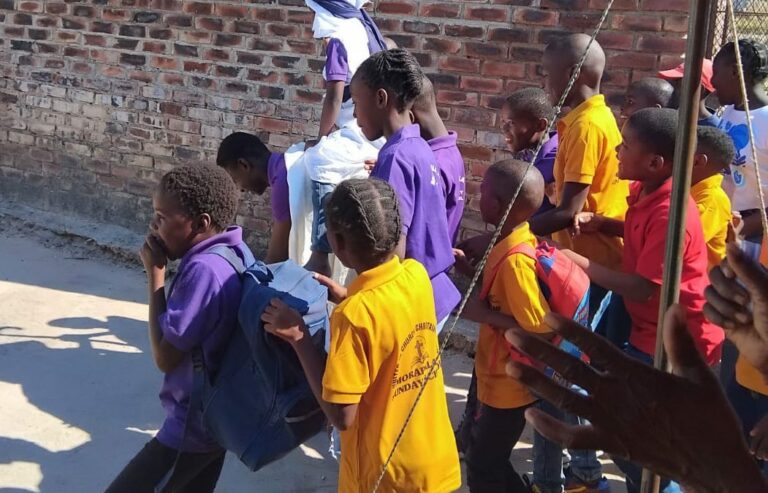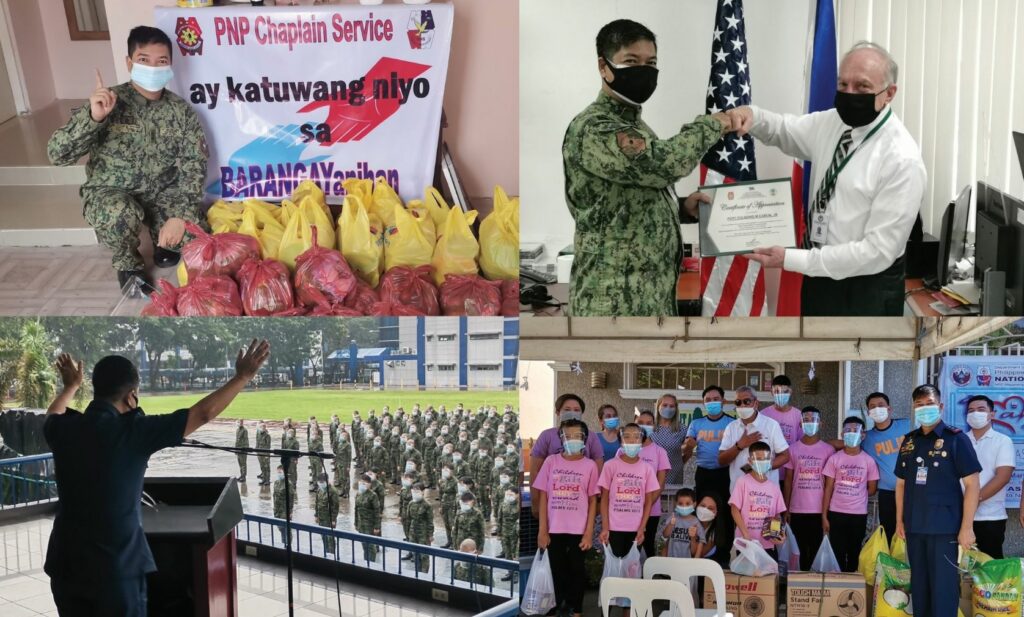
Helping Kids in Limpopo Live God’s Word
Walk Thru the Bible and instructor Ishmael Mutumwa are helping kids in Limpopo, South Africa, live God's Word!
Read MoreThere are about 120 million Filipinos in the world, and more than 10 million of them live somewhere other than the Philippines. Overseas Filipino Workers (OFWs) represent one of the world’s largest diasporas, and in many places, they live and work together in communities and have a significant influence on local cultures and economies.
In fact, substantial numbers of Filipinos live in more than 100 countries, with high concentrations in East Asia, North America, and the Middle East. In many of those places, the Christians among them are surrounded by a non-Christian culture, which can create certain challenges in living out their faith. But it also puts them in a potentially influential position—seeds of faith planted in the soil of a world in need.
But seeds don’t thrive unless they are cultivated, which makes the ministry of Filipino pastors, wherever they happen to live, extremely important. Many of them are using Walk Thru the Bible resources, leveraging technology, and making creative inroads in both traditional and non-traditional ministries to help Filipino Christians bear fruit all over the world.
Abu Dhabi
 More than 700,000 OFWs work in the United Arab Emirates. The country draws people from all over the world; more than 200 countries are represented in its seven emirates. For believers with the Great Commission on their hearts, the opportunity is clear. You can have a hand in reaching “all nations” when the nations are coming to you.
More than 700,000 OFWs work in the United Arab Emirates. The country draws people from all over the world; more than 200 countries are represented in its seven emirates. For believers with the Great Commission on their hearts, the opportunity is clear. You can have a hand in reaching “all nations” when the nations are coming to you.
Filipino Christian Church in Abu Dhabi was founded in 1984, and Pastor Benjie Masiglat began serving there in 2004. He had been a leader in Christian education, providing training for more than 100 pastors and lay leaders—some at the hands of Walk Thru the Bible instructors who came in to teach some of the ministry’s classic events. But after becoming a pastor in Abu Dhabi, he lost contact with WTB.
That changed during the first year of the pandemic. A friend told him about webinars led by Walk Thru the Bible teachers in the Philippines, and his familiarity with the ministry made for an easy bridge to its current resources. He met Gil Balignasay, Walk Thru the Bible’s regional director for Southeast Asia/Pacific, and attended more than 20 Zoom webinars, including all seven courses in the Biblical Character Series. He preached each of the series from the pulpit and invited many of his church’s leaders to learn them as well. The church now has more than 40 instructors trained in these resources, and its members have benefited greatly. “The teachings are so deep,” Pastor Benjie says, “and the people can easily relate to them.”
Before the pandemic, Filipino Christian Church had three weekly worship services—a main service on Sunday in Tagalog for Filipinos; a midday service on Fridays, also for Filipinos; and a Friday evening service in English to meet the needs of Abu Dhabi’s extremely diverse population. Benjie estimates that only about 10 percent of the emirate’s population is local; the other nine million are ex-pats. The church began the international service about ten years ago, and attendees include Indians, Brazilians, and citizens of many other nations. And even though attendance and the schedule of events has scaled back somewhat due to pandemic restrictions, the worship hasn’t stopped.
Neither has the teaching. Much of it is done in webinar format, which in spite of its limitations, often reaches people who would not otherwise be reached. Online teaching does not present the same hurdles that newcomers might feel in attending a church, and the subject of some of the courses is particularly inviting for people experiencing life’s challenges. For example, many people are reluctant to attend a Bible study because it seems so overtly religious and potentially an effort at conversion. “But if you say, ‘Hey, do you want to attend a parenting seminar?’” Benjie explains, “they will say yes.”
So resources like WTB’s Raise Up a Child and Biblical Portrait of Marriage draw people dealing with problems related to marriage and family, and sometimes people enter into a relationship with Jesus and begin attending worship from that initial experience with instruction that meets their needs. “We use that to engage people with the gospel,” Benjie says.
Webinars also include biblical overviews like Walk Thru’s God’s Grand Story and topical studies on specific portions of Scripture. And Benjie continues to preach from the Biblical Character Series in worship services. His plan for this year is to engage church members and their families in a regular family altar once a week, and he hopes to see many people come to know Jesus as Lord.
in a regular family altar once a week, and he hopes to see many people come to know Jesus as Lord.
“I am praying that many, many people will be blessed through what God is doing here in the Middle East,” he says. “We are in a Muslim country where many people do not believe in Jesus Christ as the Savior. But God is here, and He is working. People are coming to Christ in the Middle East.”
Hong Kong
Much further east and closer to the Philippines—though still in a country where Filipinos are considered OFWs—is a large congregation on the north shore of Hong Kong Island. Island Evangelical Community Church is an English language church with a strong ministry to the Filipino community. The church hosts an annual conference titled “Beloved” that coincides with Chinese New Year and involves a series of seminars and trainings for Filipino pastors, other church leaders, and their spouses in Hong Kong. More than 10 churches participate each year, and hundreds of people have been trained in some of Walk Thru the Bible’s most recent resources.
Pastor Lito Sampan leads and co-teaches this event with Gil. The two were classmates long ago and graduated at the same time, and they were trained in successive Walk Thru the Old Testament groups in the late 1990s—Gil in the first group, Lito in the second. They have been partners in ministry for years, and their churches are both in the same area of Manila.
These partners usually team up for Beloved and another conference in Hong Kong each year, and they also incorporate other leaders to address the many different kinds of ministries required of the city’s pastoral leadership.
The Beloved conference began twelve years ago when Lito offered pastoral training to one of the graduates of his ministry’s school in Manila, and it grew from there. Lito, Gil, and others joined the teaching team, and the Biblical Character Series, along with other Walk Thru the Bible resources, became part of the training program not long after. They have had a hand in influencing the city’s ministry to OFWs, more than 100,000 of whom are domestic workers and, in many cases, do not know the Lord. Through such ministry efforts, that is changing.
Looking back, Lito is somewhat surprised he is in this role. He hadn’t always planned to be a pastor. He grew up in a Catholic family of seafarers and dreamed of becoming a sailor and captaining his own ship. He had a timetable too—it was all planned out. He finished his maritime training on time, still intent on sticking to his schedule, but with enough flexibility to take a year off before applying to serve on a ship. But something happened during that one-year vacation, and his schedule was rearranged by a higher purpose. Lito heard the gospel and decided to follow Jesus, which soon led to going into full-time ministry.
But the dream wasn’t dead. Lito’s primary motivation for becoming a sailor was to see the world. When he enrolled in Bible school, he thought he was giving up his dream, but God sent him in many different directions to teach. And this way, his expenses are usually covered and his family often gets to participate with their various gifts of music, teaching, and writing. God fulfilled Lito’s vision of seeing the world in a dramatically different way, but one he wouldn’t trade for anything.
The Philippines
Pastor Lito also serves believers in the Philippines. In his early years of ministry, Lito did some church planting, served under pastors who were training leaders, and watched how they led groups and conducted seminars. From observing the pastors God had put in his path, he eventually saw himself in a similar ministry of training and equipping.
His ministry to leaders continues to expand—in Hong Kong, in the U.S., and in many other places around the world. He serves as Philippines national director of JARON Ministries International, which serves Christian leaders around the world through teaching, discipling, and counseling and serves local churches through conferences, seminars, and short-term ministries. Whether as a sailor or a pastor, he has always had a global vision.
But, like most pastors, he also has a local vision. There are, after all, about 110 million inhabitants of the Philippines who need to be evangelized and/or discipled. Lito’s local ministry is as pastor of a church in Quezon City in the Manila metro area. It’s a small, family-oriented church that gives him the flexibility to be involved in pastoral training ministries like the annual events in Hong Kong.
The combination of Lito’s local base and a global outlook seems fitting for a Philippines context—on one hand, a home country with a historically vibrant Christian culture; and, on the other hand, huge numbers of Filipinos who have been dispersed throughout the world. His heart is pulled in two directions—pastoring those who are near, and training those who are pastoring far away.
Pastor Fulgencio Cañon also has a heart for his country, but his ministry is not a typical local church. He is an evangelical chaplain of the Philippine National Police (PNP), where he teaches and ministers in a program in which PNP personnel undergo training in moral and spiritual development to strengthen the police force. Because of the diversity of the Philippines, this is necessarily an interfaith approach—he works with a Muslim imam and a Catholic priest in creating multiple faith-based groups throughout the country—but Fulgencio leads with a three-point focus: for the national force to become a God-centered, service-oriented, family-based police community.

Toward that end, the program engages 21,000 volunteer life coaches working hand in hand with the police force to instill values among its members. Many of them are evangelical pastors recruited by Fulgencio. He trains and equips them on how to minister there—“to share God’s Word in a police context so they will be more effective in sharing the gospel to the men and women in uniform,” he says.
He also organizes weekly interactive squad meetings that supports the police force’s Internal Cleansing Program. Squad leaders—senior non-commissioned officers—meet with squads for an hour each week to coach them and talk about issues related to their jobs and personal lives. As a squad leader, Fulgencio teaches them how to read and interpret the Bible and pray. “We are helping them overcome the problems, the hardships, and the challenges they are facing in the service, especially during this time of the pandemic,” he explains. “So by the grace of God, many PNP personnel have accepted Jesus Christ as Lord and Savior of their life. And some of the policemen have become pastors.”
This kind of discipleship, reaching well beyond the walls of the church, has an impact on lives that might not otherwise intersect with traditional ministries. The PNP’s Internal Disciplinary Mechanism policy requires officers to participate in the program for the sake of professionalism, character, and integrity. But through it, many of them are exposed to strong, biblical teaching from Walk Thru the Bible and other ministries. Fulgencio partners with Gil in using WTB teachings for chaplains’ continuing education—a training approach that encompasses not only chaplains in the PNP but also in the Philippines’ armed forces, coast guard, bureau of fire protection, and penal system.
The impact goes deep, not only in official matters but also in the personal and family lives of officers. Fulgencio says that resources like the Biblical Character Series—especially Crucible (on the life of David) and Detour (on the life of Joseph)—are “very relevant and very useful in building the character of PNP personnel.” Teachings apply to issues like marriage and parenting as well as on-the-job matters. On the surface, the internal programs of the PNP are designed at cultivating moral behavior and values. But discussion about practices inevitably lead to matters of the heart, where lives are changed. “The moment that you can understand this,” he says, “there is transformation—of the mind and the heart and the lifestyle itself. I’ve seen the transformation in the people.”
Fulgencio has been involved in this ministry since 2002 and began using Walk Thru the Bible material in 2006. He has taught the Walk Thru the Old Testament and New Testament events often because they make it easy for people to understand the chronology of the Bible while also hearing the message of God’s love and salvation. Though his audience comes from various religious backgrounds, he begins with what they have in common—a belief in God. From there, he says, “I grab the opportunity to teach them with Walk Thru the Bible courses and teachings. They are very helpful for them.”
One example Fulgencio gives is Detour. The life of Joseph is relevant for anyone experiencing the ups and downs of life. Many people, he says, are discouraged with their situation—perhaps not being promoted when they thought they should have been, or wrestling with more personal issues. “After the teaching, you will see a smile on their face or a nod of understanding. They will say, ‘Now I understand that God is more concerned with the development of my character rather than the fulfillment of my dream.’”
Courses on marriage and family teach them about their relationships at home and lead many to make things right with their husband, wife, or children. Many testimonies come out of these events. “They are being empowered, they are being blessed, and some of them realize they need God.”
Training Pastors
Fulgencio met Gil Balignasay about fifteen years ago through an invitation to be trained in Walk Thru the Old Testament. At the time Gil was the WTB training director for Philippines, and he introduced Fulgencio to a wide range of resources that would benefit his work with the national police. That partnership has continued, and this year he and Gil are conducting continuing education with WTB teachings for all evangelical chaplains in the PNP, armed forces, and other national institutions.
This emphasis on training pastors and leaders is part of Walk Thru the Bible’s core mission, of course, but it has risen to new levels in the Philippines in recent years. Part of that growth is due to PETS—Pastors Equipping the Saints—developed by Gil and his team. This program is part of Walk Thru the Bible’s 3-year vision to double global ministry impact. In PETS, pastors are invited to participate in the program and are challenged to continue by going through a curriculum of 11 Walk Thru the Bible titles, including its otLIVE/ntLIVE flagship events, the entire Biblical Character Series, the APL courses, and teacher training events. The curriculum fits into three categories—Introduction, Foundational, and Continuous Learning—and much of it is meant to be preached and taught by participants in their congregations.
Many pastors are being trained—72 who completed PETS in the last year, many more who learned and taught selected titles but have not yet fully committed to the whole program. Some 40,000 people have been impacted by pastors teaching these events and resources in the last year. In all, about 28,000 pastors and church leaders have been trained in at least some aspects of the PETS curriculum, most through online instruction.
These numbers reflect the principle of multiplication in action. When pastors or other leaders are trained in a PETS setting, they then take the course into their own areas of influence—small groups, congregations, and denominations. They organize and conduct their own webinars, not only teaching courses but training others to teach them as well. This may begin as a series in Sunday church services, discipleship classes, or ongoing prayer meetings, but it often goes much further denominationally, regionally, and even internationally. The pandemic has hardly inhibited the growth; teaching and training transcends all kinds of borders and barriers when it goes online.
Pastor Lito is a testimony to this phenomenon, having taken advantage of technology to train leaders in places like Malaysia, Singapore, the U.S., and countries of the Middle East. The need for this expansive training is enormous; many Filipino pastors, regardless of the region where they serve, do not necessarily have formal Bible training. Bible colleges and seminaries are available in large cities and strategic areas but are not always accessible to everyone who would like to attend for a variety of reasons—logistical, financial, and especially geographical. There are about 2,000 inhabited islands in the Philippines, and travel between them can be time-consuming and expensive. And, for obvious reasons, Filipino (or any) seminaries are not always available in countries where OFWs gather. So taking training to people, whether by seminars and conferences in person or online, goes a long way toward meeting that need.
Targeted topical resources directly address the needs not only of pastors but also of their congregations. “One of the beauties of us teaching [these resources] is we know what’s going on with their lives and can contextualize the lesson without watering down the content of it,” Lito says. The Biblical Character Series, for example, “connects with our participants whether they are pastors, church leaders, or members.”
 Detour, on the life of Joseph, is a perfect illustration, Lito says. With more than 10 million Filipinos working overseas, Joseph’s experiences in a foreign land have clear relevance to their lives. “You can imagine how they saw themselves as someone like Joseph. Same thing with Ruth in the Refuge course. The messages we are giving them really feed into their present situation. They can identify with these characters.”
Detour, on the life of Joseph, is a perfect illustration, Lito says. With more than 10 million Filipinos working overseas, Joseph’s experiences in a foreign land have clear relevance to their lives. “You can imagine how they saw themselves as someone like Joseph. Same thing with Ruth in the Refuge course. The messages we are giving them really feed into their present situation. They can identify with these characters.”
In Trying Times
Identifying with the challenges people of great faith have gone through has been especially important in challenging times. Benjie recalls many members of his church in Abu Dhabi losing their jobs in the early months of the pandemic and having to go back home. The tourist and hospitality industries, which depended heavily on OFWs, were hit hard as hotels and airlines drastically scaled back operations. Whether in the Philippines or in cities where Filipino ex-pats thrived, churches large and small had to adjust. Many services moved online. Yet, as Lito says, “the Great Commandment and the Great Commission are still the same.” People were still hungry—even more so—for eternal, unshakeable truth. The work had to continue.
Creative responses to the circumstances have varied. For Fulgencio, it was important to keep visiting police, as they continued working in essential jobs. He encouraged them face to face at quarantine checkpoints and facilities. He would quote Proverbs 3:5-6 to them, reminding them of God’s protection and His call to trust in Him rather than leaning on their own understanding.
But he also created videos offering encouragement and hope. He would pray for police and their families— many in the PNP contracted Covid, and more than 100 died from it—and was asked to pray for healing on a video that aired in the national headquarters every day at noon at the height of the pandemic. He followed up with numerous officers after they came out of quarantine, asking how they were doing. “They were happy and felt empowered because of the prayers and the Word of God,” he says.
For virtually every ministry, online teaching expanded as in- person participation dwindled or disappeared. Many members of congregations may have gotten out of the habit of attending church, but pastors were equipped with new means of spreading their message far and wide. And in many places, things are opening back up, even if some restrictions continue.
One of the most encouraging, recurring themes of the Bible is now adverse circumstances catapulted faithful people into places of greater influence and blessing. The stories of Joseph, Ruth, David, Daniel, and many others—including every disciple who thought a closed tomb represented the end of his hopes—are testimonies of God’s love of making opportunities out of obstacle.
In the Philippines—and in every place Filipinos call home—God has been busy doing just that. Thousands of people have met God or deepened their relationship with Him in the unlikely venues of a police force. Hundreds of thousands have heard messages of salvation and been discipled in person and online through resources that simply present the teachings of Scripture. And many from unexpected places around the world are telling stories of how God has worked in their lives through the faithful teaching of His Word.

Walk Thru the Bible and instructor Ishmael Mutumwa are helping kids in Limpopo, South Africa, live God's Word!
Read More
“Because of what God has done for me and in me, and because of Walk Thru the Bible, I can see a clearer path of where He was chiseling me to become who He made me to be. He is creating me to be a woman of valor, a catalyst who can help others see Him as He really is."
Read More
God is making Himself known around the world through the work of Walk Thru the Bible—from dusty playgrounds in Liberia to gang neighborhoods in Honduras and yes, even in bomb shelters in Ukraine.
Read More